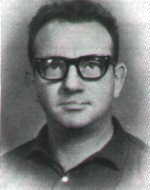Rosenosser, Moshe
Son of Shimon and Margaret. His family came from Hungary, but his parents moved from their hometown and settled in Trieste, Italy, where Moshe was born on April 14, 1928. The father was a merchant and a traveling agent, and the mother also contributed her share to the household. She ran a kosher restaurant, where many Jews who passed through Trieste on their way to Israel were given a warm corner and a Jewish meal. The family had four children, all of whom grew up in a religious atmosphere, where an Italian way of life was associated with visits to the opera and art exhibitions. Moshe attended elementary school (in a Jewish school) and secondary school in Trieste. During the Second World War, the family suffered many hardships. The parents learned that they were awaiting deportation from the city, and Moshe was sent at night to tell Jewish families that they had to escape. As a result, the families and the Rosnusser family fled to the mountains, and thanks to the family’s resourcefulness, the Germans rescued them. Moshe was 15 when he joined the Italian partisans who hid in the mountains and participated in various sabotage operations. When Italy surrendered, Moshe, as a partisan, received the status of a British soldier and moved to Rome. He was employed there accompanied by convoys of the British army. In Rome he met Jewish youth, who organized themselves as the nucleus of the future of Israel. Moshe received a certificate and immigrated to Israel on a British warship (together with his sister) in March 1945. The core reached Degania and from there to Givat Brenner. Moshe stood out and was one of the leaders of the nucleus. He was trained in Givat Brenner and was a member of the Haganah. As a member of the Hagana he was caught by the British, beaten and imprisoned in a prison in Jaffa. He then spent two months in prison in Rafah, along with his fellow members of the Haganah. Before the nuclear rise on the ground, he was in a labor company near the border in Kfar Sava. When the War of Independence broke out, the members of the group went to settle in Samaria, north of Givat Ada, where they suffered several attacks. Moshe was drafted into the IDF in early 1950. He was promoted to the rank of sergeant, and after his discharge from the army he was called for periods of service in the reserves. And his work was difficult, but Moshe carried them on his broad shoulders with perseverance and patience, and in the last year of his life he began to study at the Institute for Productivity in a high-level course for principals. Leisure liked to listen to classical music and produced He was very pleased with his work and scholastic success, and when he went to reserve duty for the last time he took books with him to prepare for the examinations that were to take place when he returned from reserve duty. On February 26, 1971, a wife and three children were brought to rest in the cemetery in Kfar Sava, and the commander of his unit wrote to his family in a condolence letter: “I knew Moshe in the circumstances In which man is reflected as being. Has always stood out in his great concern for others and his ability to deal with complex problems and situations. Moshe would easily give up his personal comfort in order to ease his subordinates. He radiated confidence in his surroundings and was a symbol of a commander in the IDF, who serves as a personal example and instilled unlimited trust in soldiers and commanders, and even in the most difficult circumstances he strove to fulfill the tasks that were imposed upon him in their entirety and above. ” The family contributed to the establishment of a scholarship fund for students named after him, in order to commemorate his name. The fund is managed by MAnd the “Rotary” Committee in Kfar Saba, where he was a member and played a significant part in his activities, mainly in activities for the Border Police.
